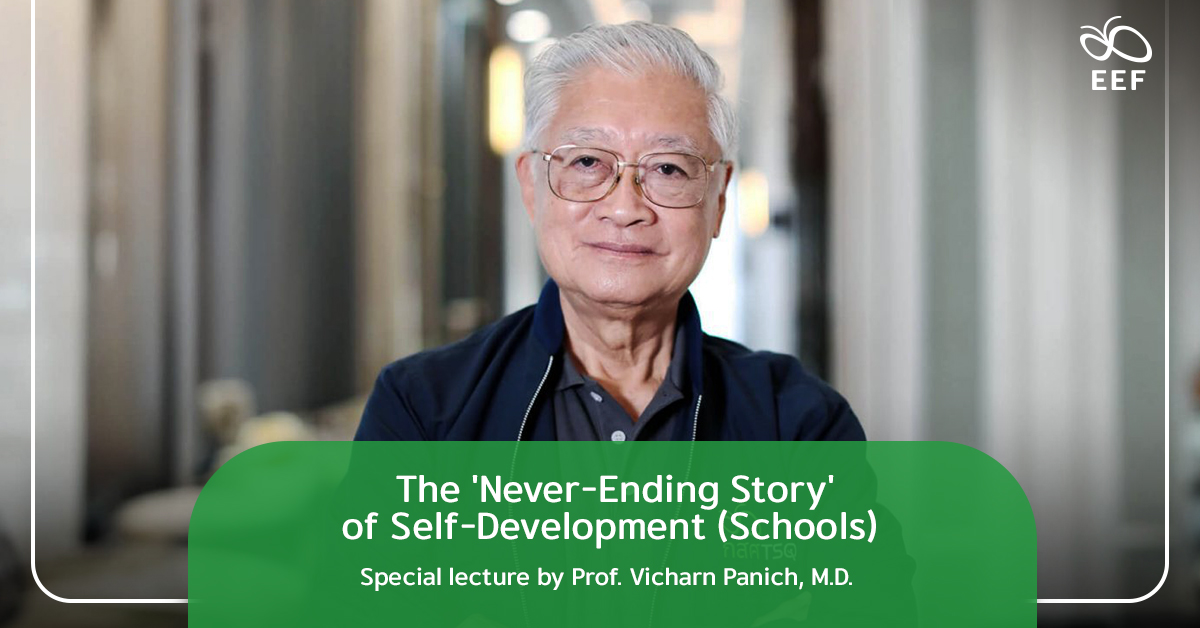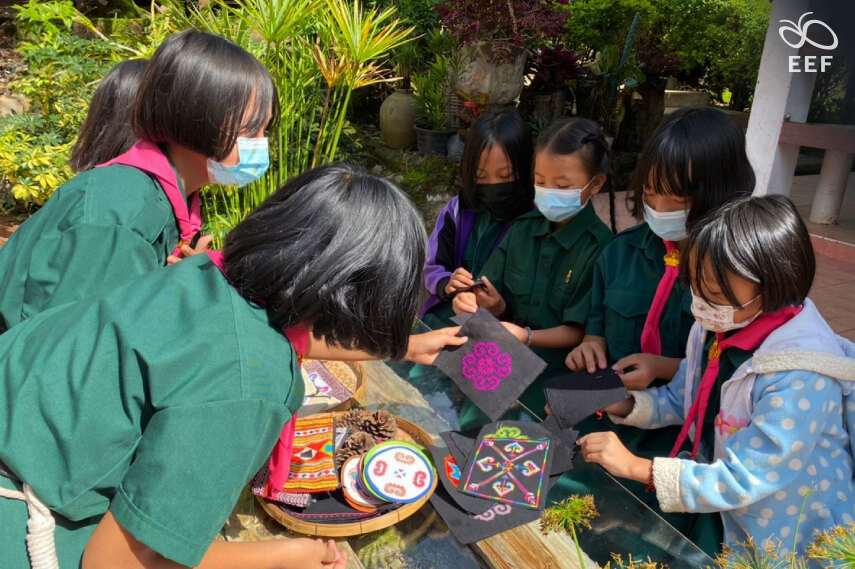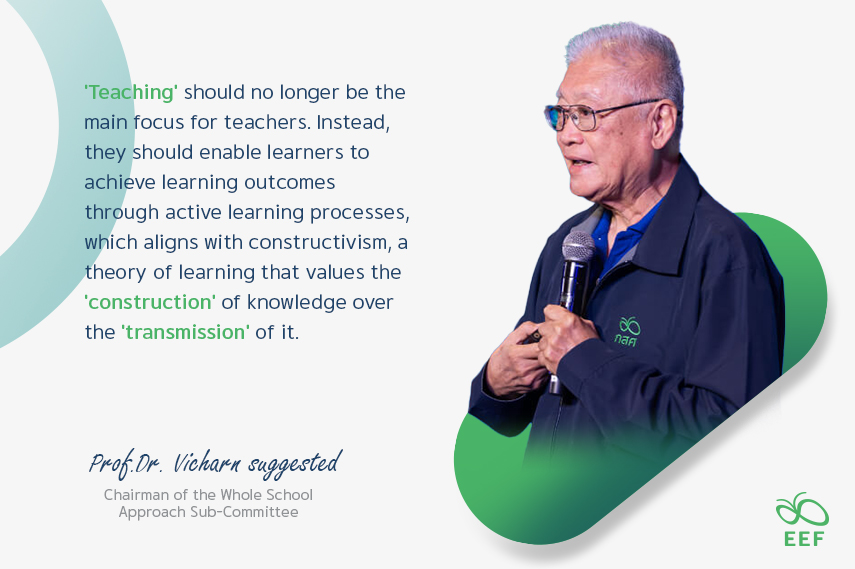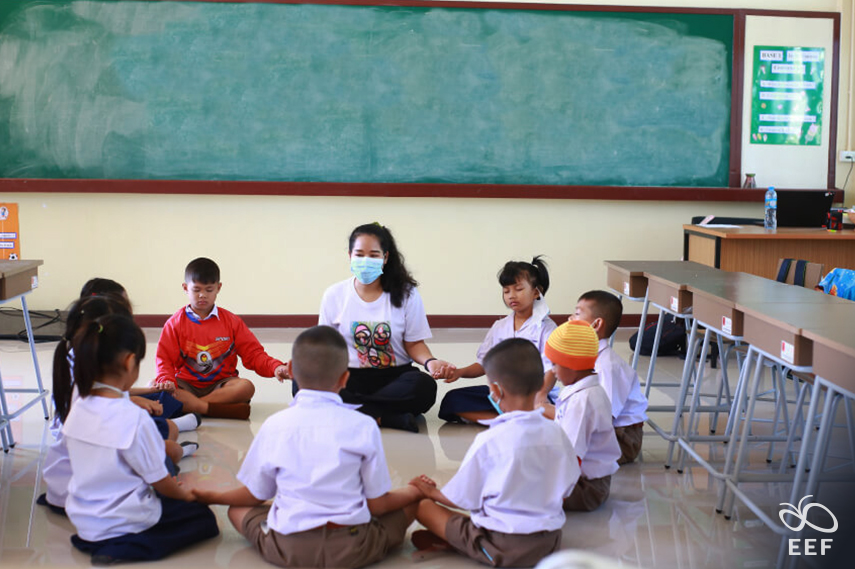
Self-development is about continuously elevating student learning outcomes according to the context of each school. Therefore, our efforts must be based on guiding questions such as ‘What should our school be like? What should administrators and teachers do? How can parents, the community, the local education district, and the sponsoring agencies play roles amidst the changing world and lifestyles of people?’
Prof. Vicharn Panich, M.D., Chairman of the Whole School Approach Sub-Committee, concluded the ‘Teacher and School Quality Program’ or TSQP, a collaborative project between the Equitable Education Fund (EEF) Thailand, 11 network partners, schools, teachers, and exemplary students to enhance the quality of education through a Whole School Approach. This includes developing the quality of management systems and ensuring high-quality teaching in classrooms, equipping students with 21st-century skills, and extending these mechanisms to drive the development of schools nationwide.

It begins with the question: In today’s complex society, how many of the approximately six hundred thousand newborns each year will be constrained by disparities in educational quality? How many will truly reach their educational goals or be able to develop themselves fully?
And it’s not just the new generation, but how can all 66 million Thais develop themselves or collectively raise the country’s learning outcomes?
Because education is for everyone, regardless of age
The TSQP program is based on the belief that schools can develop themselves through ‘support’ or ’empowerment’ instead of ‘command and control’. Initially, the program started with small and medium-sized schools, targeting groups of children who lacked opportunities or schools in remote areas, totaling approximately 700 out of the 8,000 schools under the supervision of the OBEC, accounting for 10%.

Prof. Dr. Vicharn suggested that ‘teaching’ should no longer be the main focus for teachers. Instead, they should enable learners to achieve learning outcomes through active learning processes, which aligns with constructivism, a theory of learning that values the ‘construction’ of knowledge over the ‘transmission’ of it.
“The best way to support and promote internal learning construction is through experiential learning; not only the students but also the teachers and schools must enhance their skills through experiential learning. Additionally, we must recognize that learning is no longer confined to schools. Schools must be supported by parents and community members and be able to network within and beyond their local area to elevate their self-development skills.”

The day we ‘stop’ developing, be prepared to embrace ‘failure’.
Prof. Dr. Vicharn stated that for schools to develop themselves sustainably, they must never stop questioning, especially questions based on a Growth Mindset such as:
Has the school improved after the changes? What problems still need to be addressed? How will changes be managed? How can things be further improved?
“The most dangerous thing for educational institutions and those in the education field is ‘competency’. If you think you are perfect and no longer strive for self-improvement, you have fallen into the trap of Fixed Mindset. Eventually, what was once considered perfect will deteriorate over time and circumstances, never allowing anything to remain permanent. Thus, anyone who is complacent, unaware that the world and people are constantly changing, thinks that they are competent, and stops asking new questions will become outdated and out of touch with the world in just a year or two. Therefore, school transformation must always be a continuous process, meaning it is a ‘never-ending process’.”
The TSQP program has ended, and all parties involved, whether successful or unsuccessful, must review their knowledge and have a mutual understanding of how each school can continue to develop, how to pose new questions or seek support channels. From now on, schools will shift roles from assignment recipients to complete ‘Change Agents’, moving towards becoming ‘never-ending self-development schools’. “Schools have been awakened to challenge the status quo, to use their dissatisfaction with the current state as motivation to change for the better. 80% of the work must originate from within the schools, propelling the learning process to elevate the schools through their efforts.”

In theoretical terms, the experiential learning cycle unfolds from concrete experience to reflective observation, which can occur quickly or may take time to crystallize. This is followed by the abstract conceptualization stage, leading to active experimentation.
“The recommendation is that in the active experimentation stage, learners must be able to ‘believe’ or ‘disbelieve’ in what they hypothesize, meaning that they must be ‘stubborn’ against themselves, realizing that they are not always correct. Then, when results are obtained, there must be repeated experiments in the same situation until it is certain that the results are consistent every time. Only then should one firmly believe and be ready to raise new questions to challenge their principles further.
As for the work of teachers, the cycle should start with setting the goal of how each student or class of students should change to design the learning experiences, experiment, and validate the results. It is important that one does not stop merely at obtaining methods but must contemplate, experiment, and continuously learn from feedback until it reflects the conceptualisation to the extent that it can challenge and review the theories in textbooks to determine their accuracy or comprehensiveness because given that contexts vary, textbooks cannot possibly cover every aspect. There may be gaps that teachers can see and then create new ideas that match the environment and resources available, including thinking ahead to accommodate future changes, or on another level, teachers might be able to reflect on feedback beyond the level of principles to question whether the set ‘rules’ or ‘regulations’ need to be changed in part or in whole to improve the system’s performance.
“We must not think that ‘rules’ are definitive because they are human-made. Therefore, since they can be created, they can also be changed. But what is crucial is why they should be changed: for the majority, a specific group, or all of us. People at the operational level must dare to think about making changes at that level and then aim to seek supporting forces and communicate to society that we need to improve the system for the benefit of our citizens in the future.”
Prof. Vicharn Panich, M.D., concluded that only when every school is ready to transform into a ‘school that embraces questioning’, overcoming belief in formulas or preconceived theories, will the door to ‘self-development’ be opened. We will not have teachers who block or destroy children’s natural curiosity and inquisitiveness.
Credit: Rawis Larha | Content and Writer Production Officer
Source: (TSQP) The Never-Ending Story of Self-Development Schools by Prof. Vicharn Panich, M.D.
https://www.eef.or.th/tsqp-never-ending-story-100922/

